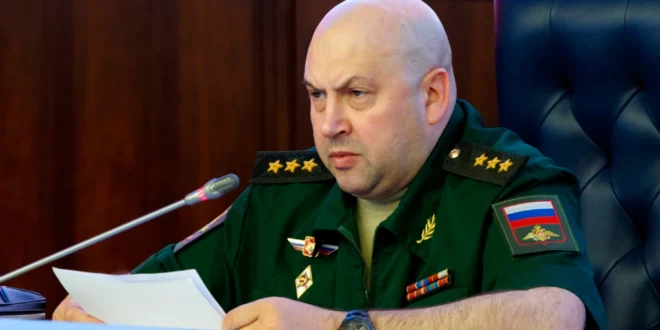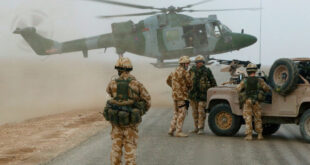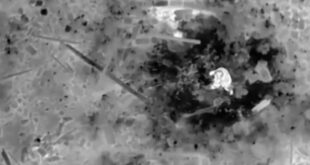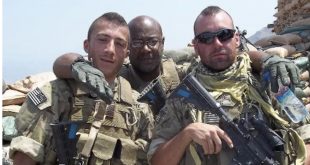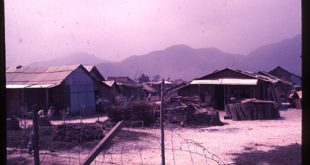by Mike Eckel, RFE/RL
“After receiving orders,” Surovikin “got in his tank without hesitation and rushed to save his country” – Yevgeny Prigozhin, Wagner Group
Just after midnight on August 21, 1991, a column of armored personnel carriers manned by soldiers from a unit of Russia’s 2nd Guards Motor Rifle Division, a storied force known as the Taman Guards, rumbled into a central Moscow tunnel, where it was met by protesters angered over an attempted coup against Soviet leader Mikhail Gorbachev.
The protesters had barricaded the road with buses and street-cleaning vehicles, and in the chaos that ensued, three of them were killed. Ultimately, the column retreated.
The clash was a turning point in the coup, which collapsed the next day.
The man who commanded the unit was Captain Sergei Surovikin, 24, a mid-ranking officer who was briefly arrested for his orders but later cleared.
Surovikin went on to a long career in Russia’s military, where he was repeatedly promoted and gained a reputation for unalloyed brutality in Chechnya and, more recently, in Syria. On October 8, President Vladimir Putin appointed the much-decorated Surovikin, who is now 56, as the overall commander of Russia’s flagging war on Ukraine.
Two days later, Russia unleashed the largest barrage of missiles and air strikes since the invasion in February, pushing the war into a potentially even deadlier new phase – with Surovikin in charge.
“For Ukraine, I’d worry a lot about Surovikin’s absolutely unforgiving attitude to the enemy — seen as combatants and civilians alike — and his laser-like focus on achieving military progress no matter the cost or risk,” said Charles Lister, who is director of the Syria program at the U.S.-based Middle East Institute and followed Surovikin’s earlier command of Russian forces in Syria.
“Ultimately, civilians are likely to suffer the most, particularly as Ukraine looks set only to continue its effective and heroic fight for its territory,” Lister said in an e-mail.
“It is doubtful whether he can change the underlying dynamic of the war, as Ukraine fields increasingly well-trained troops and advanced weapons,” Mark Galeotti, a longtime expert on Russia’s security forces, wrote in a column for The Spectator. “Nonetheless, he will presumably be expected to try and that is likely to mean many more air raid sirens in towns and cities across Ukraine.”
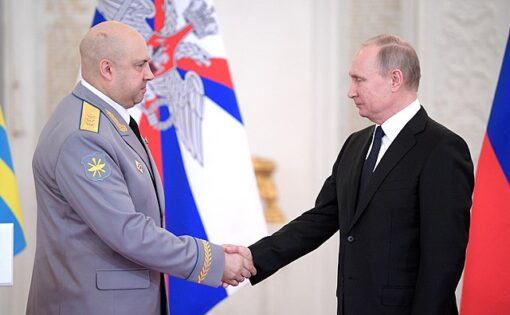
A Meteoric Rise
Surovikin’s career stretches back to some of the Soviet Union’s leading military schools. He first graduated from an officer training academy in Omsk in 1987. According to a 2005 profile in the Defense Ministry’s newspaper, Krasnaya Zvezda, he served for a time in Afghanistan with Soviet special forces.
During the chaos in Moscow in August 1991, Surovikin’s military career was accelerating. He was already a captain and battalion commander with the Taman Guards, a prestigious command for a young officer.
Some news reports from the time claim that Surovikin fired on one of the Moscow protesters himself, an allegation that was never fully substantiated. But he ended up being detained in Moscow’s notorious Matrosskaya Tishina jail for a few months before being freed in December 1991, reportedly on orders from then-Russian President Boris Yeltsin.
He was also promoted to major and enrolled at Moscow’s Frunze Military Academy, one of the country’s most prestigious Defense Ministry academies. While there, however, Surovikin was caught up in a criminal investigationinvolving arms trafficking and illegal weapons sales.
Surovikin ended up being convicted on three charges by a Moscow military court, but he was sentenced only to one year’s probation, a ruling that provoked grumbles among some military brass, particularly as Surovikin’s promotion continued unchecked.
News of the case, the lenient sentence, and the internal dissatisfaction was leaked to Russian newspapers in 2012, as were his efforts to expunge the case from his military record.
In a comment to the newspaper Komsomolskaya pravda in 2012, Surovikin said the case had been closed in 1995, claiming that he had been cleared and received an apology.
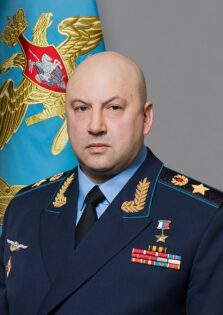
‘Everyone Has Their Own Destiny’
After the Frunze academy, Surovikin was sent to Tajikistan, where he was rapidly promoted while serving in the 201st Motorized Rifle Division, the largest Russian unit in all of ex-Soviet Central Asia. His promotions continued, with training at the academy of the General Staff in Moscow and then an assignment to command the 34th Motorized Rifle Division of the Volga-Urals Military District.
In 2004, Surovikin was investigated for an incident in which one of his chief subordinate officers committed suicide. That case was closed abruptly as well, which also sparked grumbling among some in the Defense Ministry.
“Officers of a good commander do not shoot themselves in the office with service weapons,” one officer who served in the General Staff told RFE/RL’s Russian Service in a 2017 profile of Surovikin.
Surovikin’s leadership also came under scrutiny after he took command in June 2004 of the 42nd Guards Motorized Rifle Division in Chechnya. At the time, the second war in the renegade North Caucasus region had already morphed from full combat operations into a “counterterrorism operation,” in the Kremlin’s description.
In February 2005, nine reconnaissance soldiers in a regiment under the 42nd division were killed when a wall collapsed on them in the capital, Grozny. Surovikin vowed retribution in TV appearances, but the newspaper Novaya gazeta later called the account into question, suggesting the wall had collapsed when a drunken soldier had accidentally fired a grenade launcher or mishandled a land mine.
In an interview with Krasnaya Zvezda in April 2005, Surovikin repeated the claim that Chechen “bandits” were responsible for collapsing the wall.
“In general, you can endlessly say what was done right and what was not. It’s easier to be clever when you already know what happened. But fighting is fighting. And here it is not always possible to realistically assess the situation,” he was quoted as saying.
“Everyone has their own destiny. Anything can happen to anyone,” he told the newspaper. “And not only in Chechnya.”
He joined the General Staff’s Main Operational Directorate in the aftermath of the August 2008 war in which Russia invaded Georgia. Russia was victorious, but the conflict exposed deep problems in the armed forces, prompting a sweeping effort to reform and modernize the military. According to a 2017 TASS profile, Surovikin “took this post in the context of a large-scale reform of the Russian Army, which began after the ‘operation to force Georgia to peace.'”
‘General Armageddon’
In 2017, Surovikin, then a colonel general, was promoted to command Russia’s Aerospace Forces, a sprawling amalgam encompassing the air force as well as missile units. The fact that an army officer was appointed the force commander raised eyebrows, particularly among air force officers: “The first ‘non-flying’ commander in the history of Russian military aviation,” as Novaya gazeta later described him.
He was also sent that year to Syria, where Russian forces had staged an intervention in 2015 to prop up government troops in their fight against anti-government rebels and extremist forces.
The effort was successful, not only stabilizing Syrian autocrat Bashar al-Assad’s forces but also expanding the Russian military base at the port of Tartus. But during his two tours there, Surovikin gained a reputation for merciless tactics, including oversight of the bombardments of Ghouta and Aleppo, both of which were largely controlled by rebels at the time. His command also coincided with repeated use of chemical weapons, such as chlorine bombs, by Syrian forces against civilian targets.
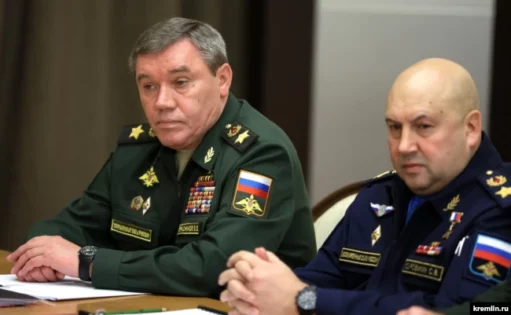
“Surovikin’s time in command of Russia’s campaign in Syria was a pivotally important one, during which Russia was finally able to determinedly shift the course of the conflict in Assad’s favor,” Lister told RFE/RL. “Surovikin’s command was clinical, brutal, and most of all, ferociously calculated.”
He also doubled down on tactics, Lister said, working with Iranian proxies in Syria, particularly with the Quds Force, an elite unit of Iran’s Islamic Revolutionary Guards Corps, and Hizbullah, an Iranian-linked militia that has been designated as a terrorist group by the United States and the European Union.
“Though mostly covert and little acknowledged, that direct coordination with the Quds Force unquestionably contributed to the strategic relationship the world now sees between Iran and Russia,” he said.
In a 2020 report regarding military attacks on Syrian civilians, Human Rights Watch named Surovikin as one of several Russian commanders who “knew or should have known about the abuses and took no effective steps to stop them or punish those directly responsible.”
Russia’s intervention in Syria was also marked by the increasing involvement of private mercenary companies, in particular Vagner, whose owner is Yevgeny Prigozhin, a St. Petersburg businessman with close ties to the Kremlin. In February 2018, a group of Vagner mercenaries and Syrian allies attacked a base where Kurdish forces and U.S. advisers were housed; U.S. forces responded with massive air strikes that killed a “couple hundred Russians.”
After the attack, Russian military bloggers pointed the finger at Russian commanders for either granting permission to the mercenary group to advance or for not providing more protection against U.S. forces.
According to Komsomolskaya pravda, Surovikin’s leadership in Syria earned him the moniker “General Armageddon” among officers.
The Kremlin awarded Surovikin the Hero of Russia medal – the country’s highest military honor – for his Syrian command. In August 2021, he was promoted to full general.
The Invasion Of Ukraine
Four months after the invasion of Ukraine on February 24, Surovikin commanded the southern group of Russian forces that was later responsible for, among other things, a grinding assault on the Luhansk region city of Syevyerodonetsk, which fell to Russian forces on June 25.
Surovikin was also still formally in charge of the southern group in Ukraine in September when Ukrainian forces staged a stunning counteroffensive in the northeastern Kharkiv region, pushing Russians troops out of the region and later taking control of the key Donetsk region rail hub of Lyman — considered a major defeat for Russian troops.
That defeat drew howls of outrage from military bloggers, right-wing commentators, and nationalists, who took to Telegram to deride Russian commanders, though not Surovikin by name. The anger spilled into wider public view in newspapers and state TV.
On October 8, Putin abruptly announced that Surovikin would be taking over as unified commander for the Ukraine conflict. The appointment came on the same day that an explosion on the bridge that connects the Russian-held Ukrainian peninsula to Russia badly damaged the structure. The blast is widely believed to have been the work of Ukrainian forces.
Surovikin’s promotion was met with plaudits from bloggers and commentators, who had been calling for a harsher approach to the Ukraine fight. That included Prigozhin, who called him “the most competent commander in the Russian Army.”
“After receiving orders,” Prigozhin said in a statement released by his company, Surovikin “got in his tank without hesitation and rushed to save his country.”
Two days later, Russia pummeled Ukraine with missiles.
 Soldier of Fortune Magazine The Journal of Professional Adventurers
Soldier of Fortune Magazine The Journal of Professional Adventurers


